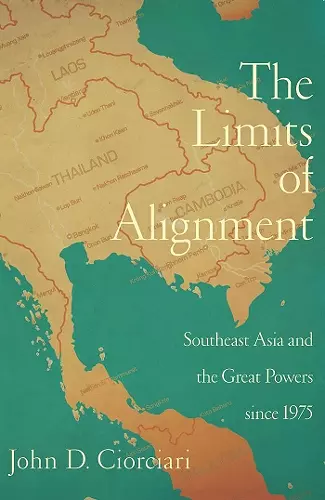The Limits of Alignment
Southeast Asia and the Great Powers since 1975
Format:Paperback
Publisher:Georgetown University Press
Published:16th Oct '10
Currently unavailable, our supplier has not provided us a restock date

By empirically demonstrating the ubiquity of limited alignment by Southeast Asian states since 1975, John Ciorciari usefully redirects our attention toward complexly contingent engagement as normal behavior in international relations. His argument is timely too, in that it showcases responses to uncertainty-a prominent current and likely future condition of (in)security in world affairs. -- Donald K. Emmerson, director, Southeast Asia Forum, Stanford University John Ciorciari's book challenges conventional wisdom about the alignment behavior of developing countries. Based on a systematic and superb analysis of the strategic behavior of ten Southeast Asian states since 1975, Ciorciari argues that most small and medium powers prefer 'limited alignments' with the great powers to balancing against, or bandwagoning with, them. This is an important contribution to international relations theory and Southeast Asian studies. -- Yuen Foong Khong, professor of international relations and John G. Winant University Lecturer, Nuffield College, Oxford University
A study that explores how small states and middle powers of Southeast Asia ensure their security in a world where they are overshadowed by greater powers. It also discusses how limited alignments in the developing world may affect the future course of international security as China and other rising powers gather influence on the world stage."The Limits of Alignment" is an engaging and accessible study that explores how small states and middle powers of Southeast Asia ensure their security in a world where they are overshadowed by greater powers. John D. Ciorciari challenges a central concept in international relations theory - that states respond to insecurity by either balancing against their principal foes, "bandwagoning" with them, or declaring themselves neutral. Instead, he shows that developing countries prefer limited alignments that steer between strict neutrality and formal alliances to obtain the fruits of security cooperation without the perils of undue dependency. Ciorciari also shows how structural and normative shifts following the end of the Cold War and the advent of U.S. primacy have increased the prevalence of limited alignments in the developing world and that these can often place constraints on U.S. foreign policy. Finally, he discusses how limited alignments in the developing world may affect the future course of international security as China and other rising powers gather influence on the world stage.
Draws from an impressive selection of secondary sources ... For those who are interested in constructing grand theoretical structures through which to understand foreign relations, Ciorciari's book is of clear value. It adds complexity to a particular view of the world and, crucially, emphasizes the agency of state actors in countries that are assigned the 'developing country' label. South East Asia Research
- Winner of International Security Studies Section Best Book Award (United States).
- Winner of Harry J. Benda Book Prize (United States).
- Winner of International History and Politics Section: Robert Jervis and Paul Schroeder Best Book Award (United States).
- Winner of History/Social Science Book Award (United States).
- Winner of Bernard Schwartz Book Award (United States).
ISBN: 9781589016965
Dimensions: unknown
Weight: 522g
256 pages